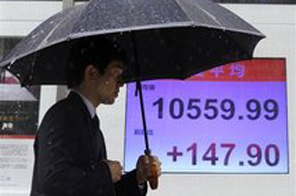Asian stocks up as US, Japan data boost confidence
HONG KONG: Asian stock markets were mostly higher Monday as better-than-expected news about U.S. job losses and Japan's business spending kindled hopes the world's two largest economies were recovering. European markets fell.
Tokyo and Hong Kong benchmarks helped lead the region's advance on the heels of a rally on Wall Street Friday, closing at their highest points in at least 10 months. Oil prices hovered around $71 a barrel.
Investors found more reasons to wade into equities after a U.S. report showed job losses slowed last month and the unemployment rate dipped to 9.4 percent, easing for the first time in 15 months. The data provided some reassuring hints of stabilization in America's job market, considered key to getting consumers to increase their spending and helping the economy stage a stronger turnaround.
Further buoying sentiment was an unexpected surge in Japan's core machinery orders, a closely watched indicator of corporate capital spending. Orders jumped 9.7 percent in June from a month earlier, exceeding a 3.1 percent rise forecast in a Kyodo news agency market survey, as global demand started to pick up.
"The trend is still upward," said Yoji Takeda, who helps manage about $1 billion in equities at RBC Investment Management in Hong Kong. "We're seeing evidence of improving conditions, so I think sentiment is generally positive."
In Europe, Britain's FTSE 100 lost 0.5 percent, and major benchmarks in Germany and France declined about 0.7 percent each. U.S. stock index futures were slightly lower, suggesting a lower opening on Wall Street Monday. Dow futures were down just 2 points at 9,323.
In Asia, Tokyo's Nikkei 225 stock average rose 112.17 points, or 1.1 percent, to 10,524.26, hitting a new 10-month high. Hong Kong's Hang Seng jumped 554.15 points, or 2.7 percent, to 20,929.52, the benchmark's best finish in about 11 months.
Australian and Taiwan markets also gained while South Korea's market closed little changed. India's Sensex traded flat in a seesaw session. Shanghai's benchmark edged lower amid continuing jitters that the rush of liquidity that's driven China's economy and markets over the last year might slow.
In Australia, shares of mining giant Rio Tinto Ltd. came under pressure, falling 3.3 percent, after the Chinese government accused the mining giant of committing economic espionage for six years. A state secrets watchdog said over the weekend that Rio Tinto's alleged spying led Chinese steel companies to overpay for imported iron ore by 700 billion yuan ($102 billion).
On Friday in the U.S., Wall Street cheered the unemployment report, and the Dow Jones industrial average rose 113.81, or 1.2 percent, to 9,370.07. The broader S&P 500 index gained 13.40, or 1.3 percent, to 1,010.48, while the Nasdaq composite index rose 27.09, or 1.4 percent, to 2,000.25.
This week, investor perceptions about the economy could be shaped by statements issued by the U.S. Federal Reserve and the Bank of Japan after the central banks hold their respective meetings in the coming days. Also in focus will be a U.S. report on July retail sales and results from Wal-Mart Stores Inc. and Macy's Inc., all of which could offer more insight on the state of consumer spending.
In China, a flood of figures set for release Tuesday about everything from retail sales and inflation to industrial production could augment investor hopes that China — home to the only large economy still expanding quickly — can make up for some of the slackening world demand.
Oil prices gave up early gains in Asian trade, with benchmark crude for September exchanging hands at $70.91 a barrel, off 2 cents. The contract lost $1.01 on Friday.
The dollar slid to 97.33 yen from 97.67 yen, while the euro was higher at $1.4202 from $1.4174.






